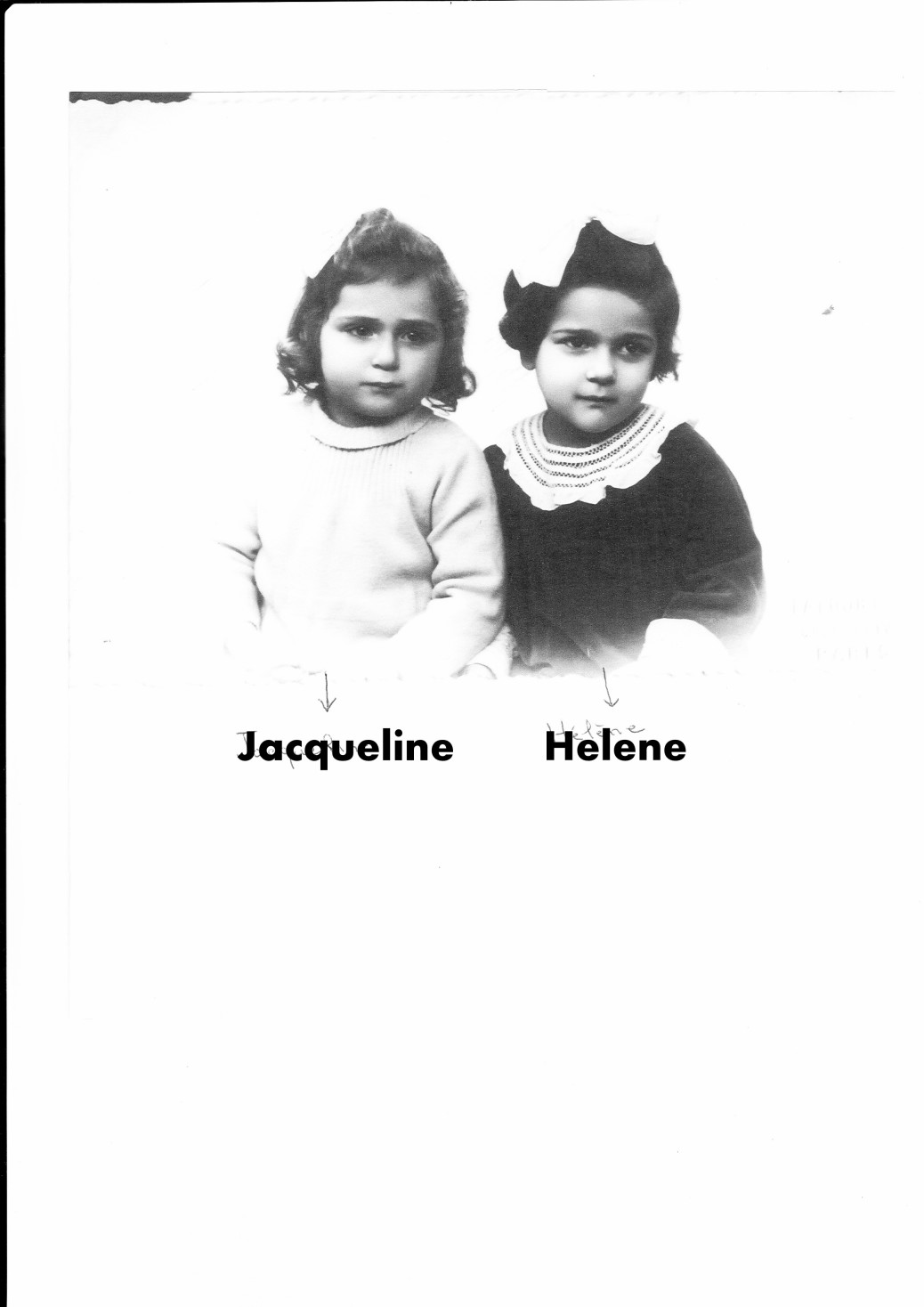Jacqueline CHALUPOWICZ
was born on April 27, 1939, in the 12th district of Paris.
Her father, Jacob Chalupowicz, was born on January 25, 1906 in Warsaw. Her mother, Ruchla Chalupowicz, maiden name Worcelman, was born on December 30, 1905 in Warsaw. Jacqueline had an older sister, Hélène, born on March 11, 1938.
They lived at 86 rue de Turenne in the 4th district of Paris. From November 24, 1936 Jacob was listed in the trade register as a tailor of leather clothing in an establishment at 3 rue Philippe-Hecht. He is listed as being “single”. He and Ruchla probably met in Paris. After their marriage she stopped working. At Jacqueline’s birth he declared his calling as “shopkeeper ”.
On May 14, 1942 the foreign Jews in Paris, mostly Polish, were summoned by the French police to different assembly points, accompanied by someone from their entourage. Those on the lists who arrived with their “green slip ? billet vert ?” were arrested immediately, while the person accompanying them was sent after their affairs and some food. The detainees were taken by bus to the Austerlitz Station and deported the same day in four special trains to one of the two camps located in the Loiret department.
Jacob was one of the 3747 Jews who answered the convocation, assuming that it was some administrative formality. He was thus arrested and interned –along with 200 other victims of the roundup – in the Beaune-la-Rolande camp on May 14, 1942, whence he was deported to Auschwitz on May 27, 1942 in convoy 5. He died there on August 11, 1942.
Ruchla and Jacqueline were arrested in July, 1942 in the Vel d’Hiv roundup. At the same time her sister Marjem and her two daughters were arrested separately. Ruchla and Jacqueline were sent to the Pithiviers camp on July 19. After the deportation of her mother in convoy 16 on August 7, 1942 Jacqueline was left alone in the camp. The little orphan was transferred on September 24, 1942 to Beaune-la-Rolande, and then three days later, on September 27th, to the Drancy camp. A tracking sheet indicates, however, that she “arrived from Pithiviersˮ1. On October 24, 1942 she was “freedˮ2; in fact she was entrusted to some nuns in a former clinic.
Ruchla died at Auschwitz on September 21, 1943.
Starting on July 20, 1944 the deportations were accelerated by Aloïs Brunner, the commanding officer of the Drancy camp. Children became fair game. Brunner decided to recover all those in the hands of the UGIF (General Union of the Israelites of France), set up on the orders of the Germans and therefore known to the authorities at Drancy. Jewish resistance activists then organized the abduction of children from the orphanages and foster homes, where most of them had been placed under UGIF control. Others were spirited out by their families and placed in “safe” places. My mother, Marjem Libson, the aunt of the two little girls, turned to one of the activists to try and get Jacqueline out, but she could not be located.
A record dated February 22, 1954 of the Ministry of Former Soldiers and War Victims (dossier 77980) indicates that Jacqueline “never returned home after being arrested in July, 1942 and interned at Pithiviers, then transferred on September 27th to the camp at Drancy. Her name is on the list of those freed from that camp on October 24, 1942, after which all trace of her is lost.” There seems to be an error in her birthdate, which makes her a year younger. Her data sheet stipulates that she was “freed by the police prefectureˮ. Could this have been on the initiative of someone in charge of registering the children and who thus provided her the official means of getting her out of the camp? And who could then have “unofficiallyˮ placed her with the nuns who took charge of the children from Drancy in a disused clinic at 67 rue Edouard-Nortier in Neuilly-sur-Seine? However that may be, when the time came, they knew where to find her.
The seventeen young children (from 2 to 11 years old) taken in by the nuns in Neuilly along with Jacqueline did not escape the murderous insanity of the Nazis. A survivor tells the following story: “The French military policeman assigned to bring in the children was moved with compassion on seeing such young children doomed to deportation, and he decided not to take them back to the Drancy camp. The vile Brunner interrogated the policeman and ordered him to bring in the children from Neuilly at once or all the children in the camp would be deported the next day.” The nuns in Neuilly, who had meanwhile dispersed the children in other hiding places, were forced to get them back under threat. On July 25, 1944 the seventeen children were bused to Drancy and added to those already there. On July 31, 1944 more than three hundred children under 18, including five-year-old Jacqueline and 18 nurslings, were deported from Drancy to Auschwitz in Convoy 77. They were gassed immediately upon arrival on August 5th.
Her aunt undertook wide research after the war to find out what had happened to her. The mixup in the birthdate confused things. In 1960 the little girl was accorded the status of “Political deportee” and the mention “DIED FOR FRANCE” was affixed to her file, “at the request of a relative”.
Hélène, Jacqueline’s older sister, evaded deportation, for when her mother and Jacqueline were arrested she was hospitalized for rickets. Her aunt managed to keep her out of the hands of the Nazis by abducting her from the hospital and hiding her with a couple of brave French women, Mme Pichon at first and then Mme Bernier in Enghien-les-Bains. When the war was over Hélène was brought up by her aunt as her own daughter, living with her new family at 12 rue de Marseille in Paris’s 10th district. She learned sewing at the ORT school (Jewish organism for job training). The drama of her early life affected her permanently. The mother of five children, she has stepped back and come to terms with that painful period.
For years and despite Jacqueline’s official status, because of the mistaken birthdate that could indicate some other person, and especially on account of the incomplete official disappearance of February 22, 1954, we hoped she might still be alive… until the exhibition organized by the Paris Municipality in 2012, where we discovered her deportation in convoy 77. A tragic destiny for so young a person, who was born to be happy, but was to know nothing but unhappiness.
Yonah Dagan
Notes :
[1] Note that the birthdate indicating 1919 has been corrected.
[2] A search file dated May 3, 1956 and August 29, 1956 specifies that the Drancy “Israeliteˮ file contains a data sheet established in the same name but indicating “1940” as date of birth (which explains the error on the memorial inscription in Neuilly, cf. photo). “Interned at Drancy on July 24, 1944, with the I.D. number 25896 and deported on July 31, 1944 to Auschwitz.” Another verification sheet dated May 7/24, 1956 retraces Jacqueline’s whole path with the correct birthdate. The copy is dated July 20, 1956, proof, if any is necessary, that the information furnished by the administration was not always trustworthy, despite the abundance of its police files and the “Jewish” dossier.
Sources :
Ruchla : deceased on September 21, 1943 at Auschwitz : http://www.lesmortsdanslescamps.com/general_fichiers/c.xml
David Diamant [pseudonyme de David Erlich], Le Billet vert. Vie et lutte à Pithiviers et Beaune-la-Rolande, camps pour juifs, camps pour chrétiens, camps pour patriotes, Édition du Renouveau, 1977.
Serge and Beate Klarsfeld, La Traque des criminels nazi, Taillandier, 2013.
It is to be noted that the memorial plaque at the Neuilly orphanage incorrectly indicates that Jacqueline was 4 years old and born at Drancy. The mistaken date is on her Drancy data sheet. As for her place of birth… The text also reports the intervention of French gendarmes, one of whom with a big heart, whereas the plaque says that it was the Gestapo that arrested the seventeen children.


 Français
Français Polski
Polski










